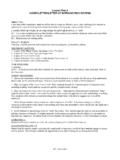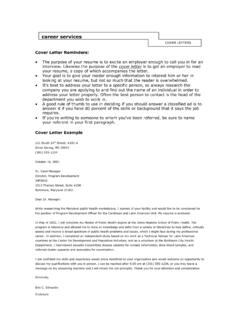Transcription of How to Write a Cover Letter - Jobs.ac.uk
1 How to Write a Cover Letter for Research Jobs An ebook with tips and examples to create the perfect Cover letterThe Cover Letter exists to: Demonstrate your enthusiasm for the post, based on the research you have done about the role and the institution (after all, you are applying for a job as a researcher!) Explain your rationale for applying and how the role fits with your career plans Answer the question Why should we hire you? by demonstrating how you meet the key criteria for the post and what sets you apart from other candidates Provide evidence of your written communication and language skills, including the ability to be clear, succinct and articulate. This is especially important for research roles as the combination of strong technical research ability and excellent communication skills is highly sought ebook focuses on Cover letters for roles in research and addresses: When to send a Cover Letter What format to use How to tailor it to a particular role Marketing yourself in the Cover Letter The do s and don ts of Cover Letter writing An example before and after Cover Letter with detailed explanations of the improvements made A checklist for you to ensure your Cover Letter is as effective as power of the Cover Letter in making an effective job application should never be underestimated.
2 A good Cover Letter will grab the employer s attention and make them want to read your CV. The purpose of your Cover Letter and CV together is to whet the employer s appetite, to establish you as a serious contender for the post and to persuade the recruiter that you are worth an jobs in research, you should aim for your Letter to be no longer than a page. In order to make an impact, and to prove that you can explain ideas fluently and clearly, the Letter needs to be succinct. This is not the place to give in-depth detail about your research; remember that the Letter may be read by non-researchers too, such as staff from Human Resources. You can always give further details of your research activities on your CV or in an Appendix to your CV. Keep paragraphs short and your typeface clear (a font size of 11 or 12 is recommended) as the employer s attention span will be brief. It is traditional to Write the Cover Letter in paragraph format, and this is the format we have used for our example Letter , although some candidates choose to use bullet points and/or bold to highlight key points.
3 The order of paragraphs is not critical, but the following is recommended:Address and salutation: Address the Letter to a named person the head of the research group. A quick email or check of the institution s website should elicit this paragraph: An introduction, explaining which job you are applying for, how you heard about the post, and some brief background on who you are in terms of your research interests and background. Middle section: Evidence of how you meet the top 3 or 4 criteria for the role, with brief illustrations of your research and your section: Explain what attracts you to this role in this institution and how the role fits in to your career plans. Concluding paragraph: A conclusion summarising what makes you suitable for the job and a statement expressing interest in an interview. When to send a Cover letter1 The purpose of your Cover letter2 The format of a Cover letter332 Tweet this ebook, share on Facebook, LinkedIn or Google+ How to Write a Cover Letter for Research JobsYou should always send a Cover Letter with your CV unless you are expressly asked not to.
4 The only exception is if you are posting your CV on a database/ with an agency where it will be seen by numerous employers, in which case a Profile on the CV itself is if you have explained your motivation for applying on the application form, it is still worth sending a separate Cover Letter . This is because the Cover Letter gives you another opportunity to market yourself and can strengthen your best way to tailor your Letter effectively is to:Your Cover Letter needs to show what a great match you are for the job. The job and person specification will only give you so much. In order to understand the job context, how your own research interests will fit into the department s research programme, what the recruiters are really looking for and how the job might develop in future you need to make your own enquiries. This could include:For example: into the University and Department s research programmes, it s research profile, the research interests of key staff and so on.
5 There is much information available publicly (for example; the department s latest research ranking, Research Body websites and on researcher forums). For external appointments, you may be limited to what is available publicly so do use your networks to access these. Most recruiters are only too happy to answer questions about the job from potential applicants beforehand. This can also help you get your name in the frame early. Just ensure that your questions are intelligent and be warned that the conversation might turn into an informal interview. You should reflect on why the employer should hire you , and refine your elevator pitch before arranging the other researchers who have worked in collaboration with them. For internal roles, you can use your internal networks to find these people. For external roles, you might ask the recruiting manager to put you in touch or use your networks to see who knows someone in the right department and depth of your research will show in your application and can really distinguish serious applicants from the rest of the pack.
6 It s also great preparation for the interview your letter454 Tweet this ebook, share on Facebook, LinkedIn or Google+ How to Write a Cover Letter for Research JobsWhilst the focus of your Cover Letter may be about communicating the relevance and depth of your research expertise and your rationale for seeking this post, don t forget to give evidence of those softer skills which may also be relevant to the job. These are likely to be outlined in the person specification and may include project planning, writing funding bids, managing other staff and communicating with colleagues outside your best way to tailor your Letter is to pick out only the top three or four criteria for the post and focus your evidence on these. If the employer is convinced you have the right credentials, experience and skills for the areas that matter most, the chances are that they will invite you to interview. Your CV and your interview can Cover the Online research4c Discussion with the recruiting manager Conversations with other researchers in the research group and department4d4e Be selectiveRemember to include your skills outside research4f4a Do your research Do: Put your most convincing evidence first.
7 You need to make an impact in the first few sentences. Talk about your current or most relevant job first F ocus on achievements in your current and previous roles rather than merely your responsibilities. Quantify these wherever possible I llustrate your achievements with brief but specific examples, explaining why these are relevant to this role. You can refer the employer to the CV for more detail Concentrate on the areas which differentiate you from the competition rather than the basic job criteria Demonstrate how well you have researched the role and the job context when explaining your career motivation Explain your rationale if you are seeking a career change or sideways move Be succinct. Ask a friend to go through it with you and edit out any wordy sentences and redundant words End on a note of enthusiasm and you Write your Letter , you need to be clear on what your Unique Selling Points are for the role in relation to the key job criteria.
8 Think about what will differentiate you from the competition. Consider who else might apply, internally and externally, and what they might offer. Consider what makes you stand out from them. This might include: Greater depth of expertise in this field or a higher research profile than other likely applicants A particular blend of experiences which give you a unique perspective ( having worked in both academic research and industry, or having research experience in more than one discipline) Specific achievements in your current and previous roles A qualification which is highly relevant to the role, but which not all the other applicants will have A passion for and commitment to this area of research or working for this institution ( perhaps you completed your PhD there) Well developed research or funding networks which could prove helpful in the job Or anything else you think might make the stand out in a way which is relevant to the yourself How to Write a Cover Letter for Research Jobs7 Tips for successDon t.
9 T ry to summarise your CV or give too much detail you need to be selective about the points that you highlight Make unsubstantiated statements about relevant skills and experience without giving examples Send the same or a similar Letter to more than one employer. Never cut and paste as employers will suspect a lack of research and career focus Make generalised statements about why you want to work for the institution ( referring to a top 50 global institution or a department with a high reputation ) Use jargon specific to your employer or profession which the employer might not understand F ocus on what the employer can do for you it s more about what you can do for the employer. 6 Tweet this ebook, share on Facebook, LinkedIn or Google+Dear Sir or MadamI am writing to express my strong interest in applying for the position of Research Fellow in Applied Health Research in the Institute of Advanced Healthcare studying for a BSc in Biological Sciences at the University of Midtown (where I scored an average of 82%) I continued my academic career by studying for an MSc in Public Health.
10 I was then accepted to study for a PhD in the Department of Applied Social Studies at South Midshire University (ranked 8th in the UK in the Sunday Times Good University Guide) which I began in September 2009 and finished in June this year. This involved competing for research council funding with 20 other applicants. My dissertation title was Health Disparities and the impact of Social Class on Clinical Outcomes . My supervisor was Dr W Jennings. I have contributed to a number of publications, including the Healthcare Science Review , Journal of Health Economics , Clinical Commissioning Digest and Review of Socio-Medical Studies . I have also attended a recent conference on Democratic Healthcare Structures within Socially Excluded am eager to further my career at your institution and am now seeking a position where I can apply my extensive research interests and Institute s tradition of excellence and its reputation for intellectual rigour are matched by my own passion for quality and my commitment to the future development of health policy research.









